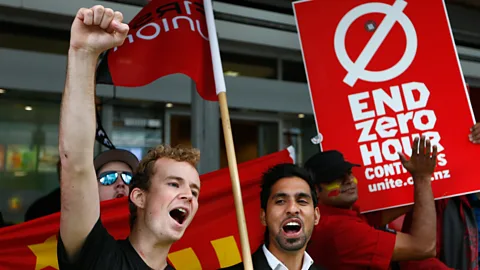
Why the millennial stereotype is wrong
[ad_1]
Features correspondent
 Getty Images
Getty ImagesThey’re lazy, bored and are constantly job-hopping – or so the stereotypes would have you believe. Jess Holland takes another look at the myths of Gen Y.
Type “millennials are” into a Google search bar, and you’ll find that “lazy” comes up as one of the top three autocompletes.
The common perception is that members of the generation born between the early 1980s and late 1990s are easily bored, crave instant gratification and would rather hop from gig to gig than stay with one company throughout their working lives. Not exactly dream employees, in other words.
But comprehensive studies in both the US and UK this year have shown the opposite is the case. It turns out, millennials are just as committed as their elders were at the same age, if not more so. What’s more, they’re not being rewarded for that loyalty.
 Alamy
AlamyMembers of the preceding generation, known as Generation X, were found to be twice as likely to keep switching employers at the same age – a good thing for them, financially speaking. Job-hopping tends to come with a pay rise of about 15% with each move, as well as the opportunity for workers to learn new skills and determine which kind employers are a good fit for them.
Meanwhile, pay rises for those who stay with one company for the long term have dwindled to almost nothing, according to the Resolution Foundation report.
The trend is evident, not just in the UK, but elsewhere.
In April, the Pew Research Center, a non-partisan “fact tank” based in Washington, DC, published similar findings, drawn from US Department of Labor data. The report found that American workers aged 18 to 35 were just as likely to stick with their employers as their older counterparts in Generation X were when they were young adults. And among those with college degrees, millennials were found to have longer track records with their employers than Generation X workers did when they were the same age.
“The economic evidence is pretty clear,” says Laura Gardiner, senior policy analyst at the Resolution Foundation and one of the authors of the report on UK millennials’ decreasing job mobility. “Young people have always changed jobs more than older people, but it’s definitely the case that the rate of mobility has fallen – for young people particularly quickly, although it’s fallen for everyone.”
The fact that young people are job-hopping less, she adds, is “a big determinant of why, for the first time in living memory, young people are earning no more now than previous generations were at the same age 15 years before.”
 Getty Images
Getty ImagesNeither report gives concrete answers about why job mobility has decreased among young people. Richard Fry, a senior researcher at Pew, wrote in his summary of the data on Pew’s Fact Tank blog, that it may be “due to a dearth of opportunities to get a better job with a different employer.”
Gardiner, meanwhile, points out that young people may be less willing to take risks having come of age during the financial crisis. There’s also the rise of zero-hours contracts and agency work, and the fact that a shift is happening in Britain “to a service economy from a manufacturing economy.” All this, she says, “may have reduced people’s confidence or bargaining power.”
According to researchers at Deloitte, which publishes an annual survey of millennial attitudes, recent political and social instability in the developed world has made young people’s desire for security even more pronounced in just the last 12 months.
The 2017 survey, for which 8,000 millennials were interviewed worldwide, shows that millennials in developed countries are less willing now to leave their jobs within two years, and more eager to stay for five or more years, than they were a year ago. “Our data suggests that these uncertain times might be driving a desire among millennials for greater stability,” the report reads.
Against this backdrop – fewer long-term jobs that come with regular pay rises, more anxiety due to experience of the global financial crash, and more worries about the future – millennials are also hitting the age at which they’re making plans to buy houses, get married and have kids.
In 2015, millennial women accounted for just over eight in 10 US births, according to Gretchen Livingston at the Pew Research Center, so it’s unsurprising that this group is focusing on their financial stability.
 Getty Images
Getty ImagesStereotypes about millennials suggest they’re not interested in old-fashioned markers of success. But when it comes to the fundamental desire for these basic anchors – a home, retirement savings, a decent career, a family – “there’s strikingly little difference between the generations,” Gardiner says.
Jennifer Deal, a senior research scientist at the Center for Creative Leadership in San Diego, California and author of What Millennials Want from Work agrees. “I don’t see different values among the generations,” she says. “They may have different ways of expressing their values, but what they want in life and work is pretty similar.”
 Alamy
AlamyWith house prices rising, and university education getting more expensive in many countries, these goals are out of reach for many millennials. That’s another possible contributing factor for this generation’s desire to stay rooted with one employer.
Seven in 10 millennials living in mature economies, according to the 2017 Deloitte Millennial Survey, would prefer to be in full-time employment, rather than freelance work, and the reasons most often given for this preference are “job security” and a “fixed income.”
“Perspectives among young people have changed since the 1970s,” Deal says; “the world has changed.” But the lament that young people lack commitment is a “typical stereotype of young people. We saw the same stereotyping of Gen Xers when they were new to the workforce.”
If anything is holding millennials back, the evidence suggests, it may be the unprecedented environment in which they find themselves, and not their attitudes to work.
[ad_2]
Source link





